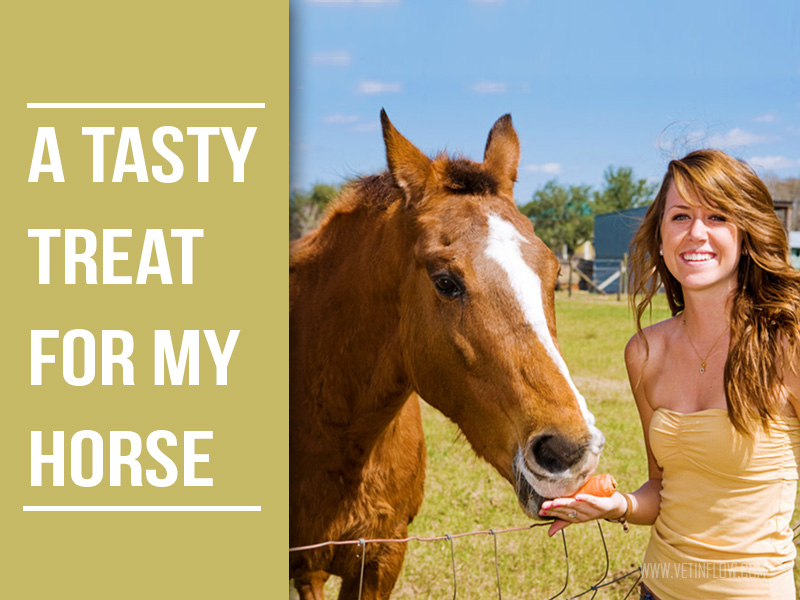
A tasty treat for my horse
Most owners like to offer their horse a tasty treat and horses are more than happy to nibble on yummy snacks. However, it is wise to be careful with what you offer, how you offer and when you offer in order to avoid digestive problems and creating bad habits.
The best treats for a healthy horse are fruits, some vegetables and nowadays there is also a wide variety of commercial horse treats available (hay cubes, flavoured pellets, etc.). Our list of safe and healthy treats for horses includes apples, carrots, bananas, grapes, strawberries, oranges, cantaloupe or other melons, raisins and sunflower seeds. You can make healthy cookies for your horse and pony using oatmeal and shredded carrot for example. You can also offer the traditional sugar cubes and mints, just make sure these are offered in small amounts.
You should avoid feeding them with onions, potatoes, tomatoes, cabbage, broccoli, cauliflower, Brussels sprouts, kale and any other foods that tends to produce intestinal gas, grass clippings and dough products as these can cause a blockage in their digestive tract.
Many horses will quickly gulp large pieces of treat without properly chewing it first. Please remember to cut treats into smaller pieces before feeding them to your horse to minimise the risk of choking and avoid feeding them unpitted fruits.
Treats should be offered in small amounts and as a general rule, one or two pieces of treat is enough. This is very important to keep in mind if you are tempted to overindulge your horse with tasty treats. Horses have delicate digestive systems that depend on a balance of bacteria and other microbes in order to function properly. Feeding them with foods that are not part of their normal diet can upset this balance and lead to serious health problems such as colic. Your horse will always want another treat and it is up to you to say no for your horse's sake.
The safest way to feed a treat to your horse is to use a bucket. If you want to feed it by hand please make sure to place the treat in the middle of your flat hand and push it slightly toward the horse's mouth, rather than withdrawing your hand as he reaches towards it. This can inadvertently cause the horse to lunge for the treat and develop a bad habit over time.
Avoid giving your horse treats on a regular basis. Horses that expect a treat at a certain time and don't get it may start exhibiting less desirable behaviours.
Most treats if feed with moderation will not negatively affect your horse. When we are discussing treats, moderation is definitely the key.
Would you like to know more about horses? Check our Equine Courses:
Equine courses
Read the previous article: Recent study shows that dogs can be pessimistic or optimistic


